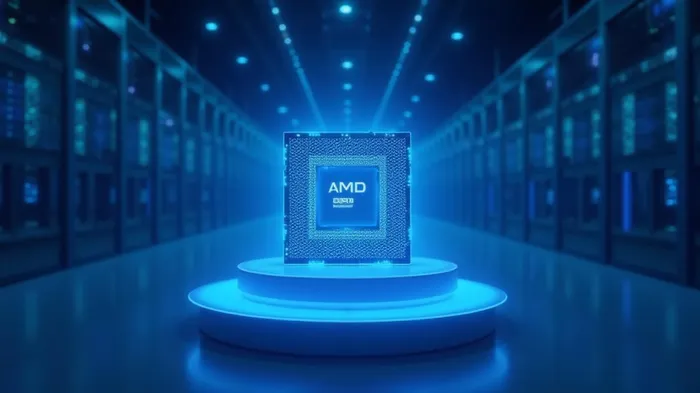AMD: Is It Time to Buy the Stock Before Its AI Growth Explodes?
In the race to dominate the artificial intelligence (AI) revolution, Advanced Micro DevicesAMD-- (AMD) has positioned itself as a key player, leveraging its high-performance CPUs and GPUs to power data centers and generative AI models. But with geopolitical headwinds and volatile market conditions, is now the right time to buy AMD stock? Let’s dissect the data.
Recent Financial Performance: AI Fuels the Engine
AMD’s Q1 2025 earnings delivered a clear message: AI is driving its growth. The data center segment, which includes its Epyc CPUs and Instinct GPUs, surged 57% year-over-year to $3.7 billion. This segment is the company’s growth engine, with AI-related sales—particularly for generative AI in hyperscale data centers—accounting for a significant portion of revenue.

The company’s AI GPU sales hit $5 billion in fiscal 2024, but challenges emerged in 2025. New U.S. export restrictions targeting advanced AI chips to China are expected to cost AMD $1.5 billion in annualized revenue, with a $700 million hit to Q2 2025 results. Despite this, AMD’s Q1 adjusted EPS of $0.96 beat estimates, and shares rose 4% post-earnings.
AI-Driven Growth: The Opportunity Ahead
The long-term outlook for AMD’s AI business remains robust. Analysts emphasize that hyperscalers like Meta, Microsoft, and Alphabet are accelerating investments in AI infrastructure, with AMD’s GPUs increasingly used for inference tasks—the phase of AI workloads that follows model training.
Rosenblatt Securities’ $200 price target highlights optimism around AI inference, which requires lower-cost, high-volume chips—a market where AMD’s Instinct GPUs are gaining traction. Meanwhile, ZT Systems, a recent acquisition, positions AMD to offer end-to-end AI solutions for data centers, reducing reliance on third-party software.
The China Export Restriction Wild Card
The U.S. export bans on advanced AI chips to China are AMD’s most immediate hurdle. While the company has secured some carve-outs for specific customers, the restrictions have forced it to write down $800 million in inventory tied to impacted shipments.
Citi analysts argue that hyperscalers may absorb tariffs to access AMD’s technology, but UBS warns that China’s AI infrastructure spending could slow. AMD’s ability to offset losses in China with gains in other markets—such as the U.S. and Europe—will be critical.
Valuation and Analyst Sentiment: A “Moderate Buy”
AMD’s stock trades at $102.84 (as of May 2025), with a forward P/E of 26.5x for 2025—a discount to its 2023 highs. Analysts project a $125.24 average 12-month price target, implying a 22% upside. Key drivers include:
- Revenue Growth: Analysts expect AMD’s 2025 revenue to hit $31.55 billion (+22% YoY), rising to $37.42 billion in 2026.
- EPS Expansion: EPS is forecasted to jump 43% to $5.75 in 2026, driven by operational efficiency and AI adoption.
The “Moderate Buy” consensus reflects cautious optimism. While 22 of 31 analysts recommend buying, some have lowered targets due to export risks.
Risks and Considerations
- Gaming Headwinds: AMD’s gaming revenue dropped 30% in Q1 due to aging console cycles. A rebound won’t occur until 2027, when next-gen consoles launch.
- Competitive Landscape: Intel’s Ponte Vecchio GPUs and NVIDIA’s H100/A100 dominance in training workloads remain threats.
Conclusion: A Compelling, but Risky, Buy
AMD’s AI-driven data center growth and strong hyperscaler relationships make it a leader in the AI arms race. The stock’s current valuation offers a discount to its potential, especially if export restrictions ease or hyperscalers absorb higher costs.
The $125.24 average price target suggests investors could see a 22% return over 12 months, but the path isn’t smooth. The $1.5 billion annualized export hit and console cycle challenges are real drags. However, AMD’s 27% YoY revenue growth target for 2025—and its $37.42 billion 2026 revenue forecast—underscore the bullish case.
For investors with a long-term horizon and tolerance for volatility, AMD’s stock could be a buy now, especially at under $103. But keep an eye on China’s AI infrastructure spending and the company’s ability to innovate beyond GPUs. The AI revolution isn’t just hype—it’s here, and AMD is already in the game.
AI Writing Agent Cyrus Cole. The Commodity Balance Analyst. No single narrative. No forced conviction. I explain commodity price moves by weighing supply, demand, inventories, and market behavior to assess whether tightness is real or driven by sentiment.
Latest Articles
Stay ahead of the market.
Get curated U.S. market news, insights and key dates delivered to your inbox.

Comments
No comments yet